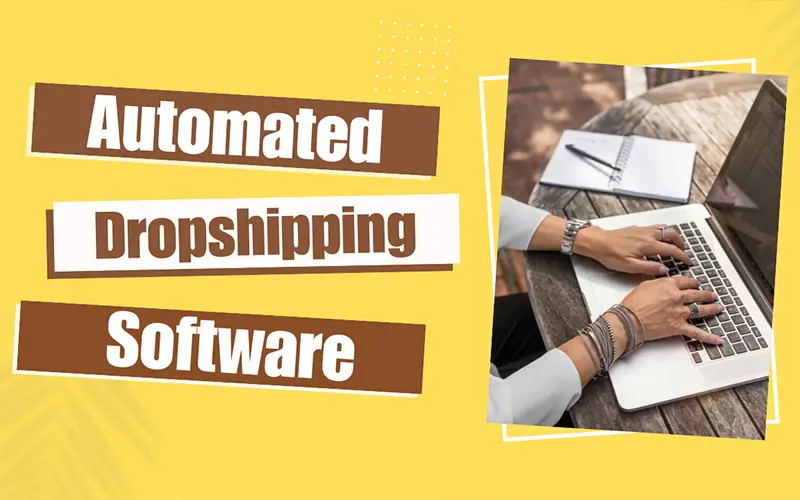Automated dropshipping has transformed the modern-day, fast online shopping world. It allows businesses greater efficiency and seamless operations. By implementing dropshipping automation software, companies streamline day-to-day tasks such as inventory management and order processing.
Automation software guarantees a smooth client experience by reducing the chances of error and manual work. Dropshippers have access to the best solutions to their needs, both commercial and free. In this guide, we will dive deep into the 13 automated dropshipping software choices, assisting businesses to enhance their operations and remain competitive.

What is Automated Dropshipping?
Automated dropshipping is an e-commerce model where businesses utilize automated tools and software. These tools manage essential processes such as inventory management, order processing, and product shipping. This approach significantly reduces manual effort, minimizes errors, and enhances operational efficiency.
Leveraging these tools, including many free options, dropshippers can streamline their workflows and focus on scaling their business. Dropshipping automation software is crucial in helping companies stay competitive in the fast-paced e-commerce landscape. These software offer solutions that simplify and optimize the dropshipping process.
Pros and Cons of Automated Dropshipping
Pros
Automated dropshipping offers several advantages, primarily through automated dropshipping software. One of its significant benefits is high efficiency.
These automation tools streamline tasks like inventory management, order processing, and saving time and resources. This efficiency leads to lower order fulfillment costs, as the need for manual labor is reduced.
Another advantage is reduced mistakes. Automated systems minimize human error in tasks like shipping and inventory updates. This improves efficiency and accuracy across operations.
Additionally, dropship automation software enables effortless scalability. It allows businesses to handle increased volumes seamlessly, making it easier to expand without substantial additional investment.
Cons
However, there are also drawbacks to using automated dropshipping tools. A key concern is that the process relies heavily on automation. This means you have less control over certain business aspects, such as product quality and supplier management.
The costs of software subscriptions can also be significant, particularly for advanced features. This may be a financial burden for smaller businesses.
Moreover, implementing and managing automation software often requires technical expertise. This can be a challenge for those new to e-commerce technologies.
Lastly, potential issues such as software glitches or compatibility problems with other systems can disrupt operations and require technical support.
How to Automate Your Dropshipping Store
Automating your dropshipping store can streamline operations and boost efficiency. Here's a step-by-step guide to help you get started with dropship automation software:
- Sign Up with EPROLO for Free: Create an account with EPROLO, a popular dropshipping automation software that offers a free signup. This platform helps streamline various aspects of your business, from product sourcing to order fulfillment.
- Connect Automation Software with Your Store: Integrate the dropshipping automation tool with your e-commerce store. This connection allows for seamless synchronization of product listings, inventory levels, and orders. It ensures real-time updates and reduces manual input.

- Automate Inventory Management and Order Fulfillment: Utilize the software to automate inventory management and order processing. This feature ensures that your inventory is always up-to-date and route orders are fulfilled promptly. It minimizes delays and stockouts.
- Utilize Markup Pricing Tool: Take advantage of the markup pricing tool offered by the dropship automation software. This tool can automate pricing based on your desired profit margins, helping you maintain competitiveness and profitability.
- Automate Order Tracking Updates: Send order tracking updates to your customers. It improves customer satisfaction by keeping them informed and reduces the workload on your customer service team.
13 Best Dropshipping Automation Softwares
1. EPROLO
EPROLO is a comprehensive dropshipping automation software designed to simplify various aspects of running a dropshipping business. It offers robust inventory management tools that help keep stock levels accurate and up-to-date, preventing overselling and stockouts.
Additionally, the platform allows for seamless product import. This feature enables users to quickly add new items to their store with just a few clicks.
Another standout feature of EPROLO is automated order processing. This system streamlines the process by automatically fulfilling orders from the moment they are placed until they are shipped. It includes tracking delivery, real-time updates to the business owner and the customer, and enhancing transparency and customer satisfaction.

EPROLO also includes price optimization tools. These tools help businesses adjust pricing strategies to maximize profits while staying competitive.
Besides, the platform supports a branding project (private label) feature. It allows dropshippers to create and sell branded products, increasing brand recognition and customer loyalty. With these comprehensive features, EPROLO is an excellent choice for those looking to streamline their dropshipping operations.
2. Easync
Easync is an all-in-one automated order fulfillment software that simplifies various aspects of the business. It helps users discover profitable products by analyzing market trends and identifying top-selling items.
The platform offers suppliers sourcing, connecting reliable suppliers to ensure a steady supply of products. Plus, Easync is compatible with major ecommerce platforms, including Amazon, eBay, Walmart, Shopify, and Costco. This makes it versatile and easy to integrate into existing businesses.
This tool is designed to streamline operations, from product selection to order fulfillment, enhancing efficiency and profitability for dropshippers.
3. Yakkyofy
Yakkyofy is a versatile automated dropshipping software offering a range of features to streamline your business. It provides automated product listing, making it easy to add new products to your store quickly.
This ecommerce platform includes real-time stock level updates. This feature ensures you always have accurate inventory information to avoid overselling. Yakkyofy also offers products and media assets, including 3D files for augmented reality (AR). These assets enhance product presentations and customer engagement.

Additionally, it features an eWallet for automatic payments. This simplifies financial transactions with suppliers and improves the overall efficiency of your operations.
4. AutoDS
AutoDS is a comprehensive dropshipping automated solution designed to optimize various aspects of your ecommerce business. It features a product title and description generator. This tool helps create compelling and SEO-friendly listings.
The platform allows users to import winning products from global dropship suppliers. It ensures a diverse and competitive product range. AutoDS also supports print-on-demand. You can create and sell custom-designed products. This allows you to expand your offerings without holding inventory.
Additionally, it provides robust price & stock monitoring, keeping you updated on market changes and ensuring optimal pricing strategies to maximize profits.
5. Inventory Source
Inventory Source is a powerful dropship automation software that helps streamline product management and sales. The platform lets you publish products automatically. This feature makes it easier to maintain a current and appeal inventory.
It features tools to sync inventory and pricing. This ensures that your product listings are accurate and up-to-date across all channels. Inventory Source integrates seamlessly with the top ecommerce platforms, enhancing compatibility and ease of use.
Additionally, it offers a dropship profit calculator to help you assess potential earnings. A PayPal fee calculator helps you account for transaction fees accurately. These tools optimize your pricing and profitability strategies.
6. Ordoro
Ordoro is a versatile inventory and shipping management software tailored for ecommerce businesses. It offers robust features for managing and optimizing inventory and shipping processes.
The platform provides detailed cost and price analytics, as well as marketing and competitor analytics. This helps businesses make informed decisions to stay competitive.
One of its key features is the ability to automatically write backtracking numbers. This feature streamlines the shipping process and improves customer communication.
Additionally, Ordoro supports barcode generation and scanning. These tools enhance accuracy in inventory management and order fulfillment. Ordoro is an invaluable software for scaling and managing an efficient dropshipping operation.
7. Zendrop
Zendrop is a comprehensive automated order fulfillment software designed to streamline e-commerce operations. It offers real-time analytics, providing insights into sales performance and customer behavior.
The platform features a trending product finder. This tool helps identify popular items. It allows you to stay ahead of market trends. Zendrop's extensive product catalog makes it easy to find dropshipping products to import. This expands your inventory with minimal effort.

Additionally, the platform ensures quick order processing. This enhances customer satisfaction by reducing fulfillment times. These features make Zendrop an excellent choice for dropshippers to optimize their business processes and maximize profitability.
8. Zik Analytics
Zik Analytics is a powerful product research tool tailored for dropshipping businesses, particularly on platforms like eBay, AliExpress, and Shopify. It offers accurate and reliable data analysis, helping users identify trends and make data-driven decisions.
The platform provides unlimited profitable product and competitor searches. This allows dropshippers to discover high-demand products and analyze competitors' strategies.
This feature-rich software aids in optimizing product listings and pricing strategies. It makes staying competitive easier in the dynamic e-commerce landscape. Zik Analytics is an invaluable resource for dropshippers to enhance their market presence and increase profitability.
9. Koala Inspector
Koala Inspector is a specialized Shopify Inspector tool designed for in-depth competitor analysis. It helps users track competitor stores' latest product launches, price modifications, and aesthetic transformations. This tool provides valuable insights into market trends and strategies.
The platform offers practical and intuitive applications and tools tailored for Shopify stores. These tools simplify the process of understanding competitor dynamics and optimizing their stores.
Koala Inspector also enables users to uncover best-selling products and discover winning themes. It helps them to identify what works in the market and apply these insights to their e-commerce strategies.
10. Klaviyo
Klaviyo is a robust marketing automated dropshipping tool that leverages AI to enhance ecommerce marketing strategies. It offers a range of tools, including email marketing, SMS marketing, mobile push notifications, and customer reviews. This helps businesses engage with customers effectively.
Klaviyo can automatically sync all-time historical and real-time data. It provides comprehensive insights and drives targeted marketing campaigns.
This data integration ensures that businesses can personalize communication. This boosts customer engagement and conversion rates. Powered by AI, Klaviyo's analytics and automation features enable companies to achieve better customer retention and sales growth results.
11. Zapier
Zapier is a versatile dropshipping automation platform that connects two or more applications and supports over 7,000 apps. It streamlines workflows and enhances productivity.
By integrating various tools, Zapier automates tedious tasks, such as data entry, notifications, and reporting, without coding skills. This integration capability helps teams see how Zapier is utilized across different functions. It provides transparency and insight into workflow automation.
One of Zapier's key features is its ability to prevent issues like access control errors and identify anomalies. This ensures automated processes run smoothly and securely.
Zapier significantly enhances efficiency by handling tasks, allowing businesses to focus on more strategic activities. Zapier syncs customer information, automates social media posts, and manages customer orders. Its powerful automation tools make it easier for businesses to scale and optimize their operations.
12. Fotor
Fotor is a powerful and easy-to-use online photo editor that caters to the needs of ecommerce businesses. It allows users to edit photos in bulk, making it ideal for managing large volumes of product images.
Fotor's tools are designed to suit the requirements of major e-commerce platforms. Its images meet specific size and quality standards. The platform also offers diverse AI tools for both image and video editing.

It can enhance visual content with features like background removal, color correction, and special effects. This versatility makes Fotor a valuable tool for improving the visual appeal of online stores.
13. Tidio
Tidio is a comprehensive AI customer service and chatbot solution. It enhances customer engagement and support for ecommerce businesses. It features live chat and helpdesk tools. These tools allow you to track users across your website.
They provide insights into the pages they are browsing and their interests. This real-time interaction helps in delivering personalized customer experiences.
Tidio also offers plug-and-play Flows. The Flows automates various customer service tasks, such as handling missed conversations, offering discounts, and recommending products. These features improve customer satisfaction and boost conversion rates and sales, making Tidio an essential tool for online stores.
Automated Dropshipping: Conclusion
Automated dropshipping has revolutionized the e-commerce landscape by offering a streamlined and efficient way. Businesses can automate critical processes such as inventory management, order fulfillment, and customer communication by leveraging automated dropshipping software.
This automation reduces manual labor and minimizes errors. It allows for effortless scalability, enabling businesses to grow without significant additional resources. However, it's essential to be mindful of the potential drawbacks, such as less control over inventory and software subscription costs.
Choosing the right tools, such as EPROLO, AutoDS, or Tidio, can significantly impact your business's efficiency and profitability. Automated dropshipping offers numerous benefits that help companies stay competitive in a rapidly evolving market.
Automated Dropshipping: FAQ
1. Is automated dropshipping suitable for beginners?
Yes, automated dropshipping is suitable for beginners. It simplifies many complex processes, such as inventory management and order fulfillment. It is easy for newcomers to start and manage an e-commerce business.
Many dropshipping automation software tools are user-friendly and offer comprehensive support, including tutorials and customer service. This can help beginners navigate the system.
2. Can dropshipping be fully automated?
Many aspects of dropshipping can be automated, such as product sourcing, order processing, and customer communications. Honestly, full automation is challenging.
Some elements, like handling customer service issues or quality control, still require human oversight. However, automated dropshipping software can significantly reduce manual workload and streamline operations.
3. What is the best dropshipping software?
The best dropshipping software depends on your specific needs and business model. Popular options include EPROLO, AutoDS, and Inventory Source.
They offer unique product sourcing, price optimization, and inventory management features. Choosing software that integrates well with your e-commerce platform and aligns with your business goals is crucial.







